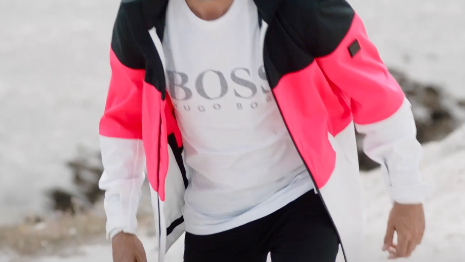 Alex Thomson in The Journey. Image Credit: Hugo Boss
Alex Thomson in The Journey. Image Credit: Hugo Boss
German fashion house Hugo Boss has released a video ad campaign featuring its newest capsule collection of recycled pieces, strongly encouraging a shift towards a more environmentally-conscious fashion industry.
As an industry leader in the responsibility movement, Boss is motivating its consumers to join its journey towards a completely sustainable future. The video campaign showcases the brand’s new sailing collection and features British yachtsman Alex Thomson.
“Consumers demand it, the environment demands it. Using sustainable materials and sustainable methods and processes is the future,” said Milton Pedraza, CEO of Luxury Institute LLC, New York. “From raw materials to the finished product, sustainability will be injected into every part of the process.”
Commitment to the climate
Due to rising sea levels, increased pollution and environmental damage, consumers are becoming more conscious than ever about what they are buying and from who they are buying. Over the years, Hugo Boss has openly supported sustainability practices through every element of its business.
The inspiring film features Boss ambassador Alex Thomson and a diverse group of models individually walking through beaches, meadows and forests, speaking about taking responsibility and moving forward to create a better world for future generations.
The Journey, starring Alex Thomson
The collection, suitable for both sailing and leisurewear, is made from recycled polyester, woven using Social Plastic by Plastic Bank and organic cotton sourced from COTTONFORLIFE—an initiative promoting sustainable fashion by creating a transparent, eco-friendly and socially responsible value chain.
Boss has already made an impressive impact on the environment, but aims to go further in the quest for a fully sustainable world.
The fashion company's goals include, but are not limited to: a 30 percent reduction of carbon dioxide emissions by 2030, use of 100 percent sustainably sourced cotton by 2025, use of 100 percent recycled plastic or sustainably sourced material by 2025 and reaching 1,400 children through the Hugo Boss Education Association by 2025.
 The Journey Capsule Collection. Image Credit: Hugo Boss
The Journey Capsule Collection. Image Credit: Hugo Boss
In accordance with nearly 100 other international companies, Hugo Boss signed the Fashion Industry Charter for Climate Action in 2018. Through this, the brand is committed to the vision of a climate-neutral fashion industry by 2050 and is contributing towards development goals for clean water and sanitation, responsible consumption and production and climate action.
A new pillar of luxury
While Hugo Boss is a driving force towards a more sustainable future as a fashion company, it is not the only one. Luxury brands across the industry have taken responsibility facing a socially and environmentally conscious market and have begun incorporating sustainable materials and practices into their foundations.
British department store chain Selfridges is featuring sustainability at this year’s Christmas Shop with half of the products, including decorations, cards and wrapping paper, having at least one sustainable attribute. This is the largest sustainable collection Selfridges has offered for the holiday, as they have implemented a new expansive environmental strategy (see story).
Since 2017, French luxury group LVMH Moët Hennessy has partnered with Central Saint Martins Design school to invite students to present projects that demonstrate how design can respond to climate change. The platform created a network of makers to help designers create their garments locally with recycled or upcycled textiles (see story).
“For any brand, sustainability can make them stand out and be more compelling, particularly for younger consumers who really care about this. It has a great potential to differentiate a brand and drive its revenue,” said Mr. Pedraza.
